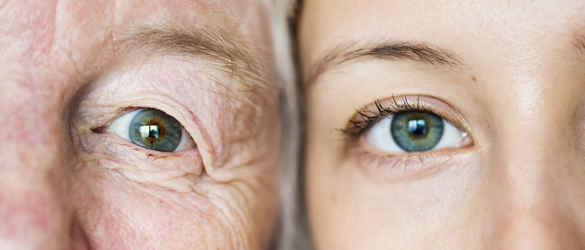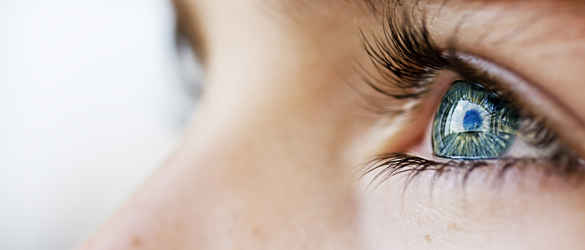
What is macular disease?
Macular disease is the biggest cause of sight loss in the UK and developed world. It affects people of all ages and nearly 1.5m people in the UK have macular disease.
The macula is a tiny area of the retina at the back of the eye, which is only about the size of the grain of rice. It is responsible for our central vision, most fine detail of what we see and a lot of our colour vision too.
If your macula becomes damaged, as it does in macular disease, then your vision may become blurred or distorted. Gradually, the photo receptors in the macula die and you lose your central vision.
That means people with advanced macular disease can struggle with every day tasks and cannot drive or read. They may have difficulty seeing faces, and recognising friends and family becomes very difficult.
Types of macular disease
There are many forms of macular disease. The most common condition is age-related macular degeneration (AMD), which generally affects people over the age of 50. It’s the biggest cause of sight loss in the UK, affecting more than 700,000 people.
Other forms of macular disease can affect much younger people, including children, with common conditions such as Stargardt disease, which is a genetic condition, and diabetic macular oedema.
Those with macular disease may also experience Charles Bonnet Syndrome (CBS), where visual hallucinations happen as a result of sight loss.
A to Z of macular conditions
Macular disease affects nearly 1.5m people in the UK and can occur at any age. While age-related macular degeneration (AMD) is the most common, there are many other types including rare inherited conditions called macular dystrophies which can affect much younger people.
Causes of macular disease
There’s not one single cause of macular disease. Some macular conditions are genetic, meaning they’re caused by a change in the genes involved in vision.
For other conditions, such as AMD, the exact cause is unknown. However, it's been linked to factors such as ageing, smoking, high blood pressure, being overweight and having a family history of the condition.
What are the symptoms of macular disease?
Depending on the form of macular disease you have will depend on the symptoms you experience.
Common symptoms across all forms of macular disease may include difficulty seeing in low light, trouble reading, driving or doing close-up work, and blurry, fuzzy or distorted central vision.
Diagnosis and tests for macular disease
Early detection can be key to help slow vision loss. Having regular eye exams can help detect early signs of macular disease, even before noticeable vision problems occur.
Many high street opticians now have sophisticated eye scanning machines, called OCT scanners, which are helping to diagnose more people with macular conditions.
If it’s suspected you have a genetic form of macular disease such as macular dystrophy, you might be offered a genetic test.
This usually involves having a saliva (spit) or blood sample taken, where DNA is extracted from saliva or blood cells and analysed in the laboratory to try and identify the genetic alteration that is causing the condition.
If you notice any changes in your vision, it’s important to get checked out by your optician or eye care specialist.
Treatment options for macular disease
The treatment available will depend on which form of macular disease you have.
Take a look at treatments to find out more about the various treatments.
Living with macular disease
When you start to lose your central vision due to macular disease, it can make daily life more challenging.
We’ve got lots of practical tips to help you feel more independent in your home with advice on everyday activities including preparing meals, gardening and using technology.
If you have macular disease, it’s important that you don’t feel alone. We have plenty of support available such as our counselling service and nationwide support groups.
Is your sight at risk?
Worried you might be at risk of macular disease?
Just answer five simple questions and we'll estimate your risk of age-related macular degeneration (AMD). It'll only take a minute, and it could make a world of difference to your sight.
Check your riskFrequently asked questions
-
What is macular disease?
Macular disease refers to a number of eye conditions that affect the macula, the central part of the retina responsible for sharp, detailed vision. It’s the leading cause of sight loss in the UK.
-
Who is at risk of developing macular disease?
Anyone can develop macular disease, but risk for AMD increases with age. Other risk factors for AMD include smoking, high blood pressure, obesity and a family history of the condition. If a family member has a macular dystrophy, you may be at higher risk of developing the condition. A genetic diagnosis can help explain the risk for other family members.
-
What are the early signs of macular disease?
Currently there is no cure or reversal, but treatments can slow or even stop progression, especially in wet AMD.
-
What is age-related macular degeneration (AMD)?
AMD is the most common type of macular disease and typically affects people over the age of 50. It gradually damages the macula and leads to loss of central vision.
-
Can macular disease be cured?
There is currently no cure for macular disease, but treatments are available for some types, particularly wet AMD and diabetic macular oedema, that can help slow progression and manage symptoms.
-
How is macular disease diagnosed?
It can be diagnosed through a comprehensive eye exam. Many opticians use advanced imaging tools like OCT scanners to detect changes in the retina. Genetic tests may be offered for inherited forms.
-
What treatments are available for macular disease?
Treatment varies by type and may include anti-VEGF injections, laser therapy, dietary supplements, or low-vision aids. Your eye specialist will recommend the best option based on your condition.
-
Is macular disease the same as complete blindness?
No, macular disease affects central vision, but peripheral vision is usually retained. While reading and recognising faces may become difficult, people with macular disease are not usually completely blind.
-
How can I live independently with macular disease?
Many people live full, independent lives with macular disease. Assistive technologies and support groups can help you adapt to vision changes and maintain your quality of life.
-
Where can I find support and more information?
You can access practical advice, counselling and local support groups through the Macular Society. Visit our support and treatment pages for more resources and ways to connect.
What is the macula?
The macula is part of the retina at the back of the eye. It’s only about 5mm across, but is responsible for our central vision, most of our colour vision and the fine detail of what we see. Damage to the macula can dramatically affect your sight. Learn more about what the macular is and why it is so important.
Macular conditions
There are many types of macular disease that affect people of all ages. The most common is AMD, but other conditions can appear earlier in life. Learn more about AMD and other macular conditions.
Support for you
We provide free information and support to those with macular disease, along with their family and friends, to help people keep their independence.
Last reviewed: July 2025
Free confidential advice and support
Call our helpline on 0300 3030 111
Lines are open 9am - 5pm Monday to Friday
About the Macular Society Helpline




